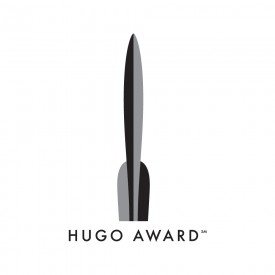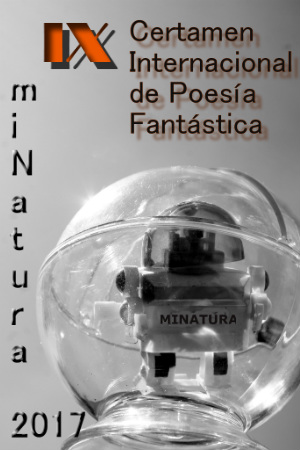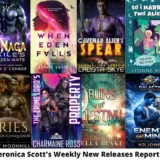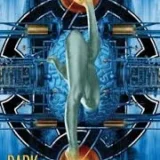
Over the last decade Nina Allan has established herself as one of the UK’s most imaginative and compelling writers. All the more remarkable that she has done this without, until now, producing a novel. Instead, since making her debut in 2002, Allan has published at least 50, often lengthy, short stories. Her choice of subjects range from science fiction to dark fantasy, but her work is unfailingly distinguished by intelligence, perception, empathy, an elegant prose style and a restless sense of enquiry. Some stories have appeared in the collections A Thread of Truth (2007), The Silver Wind: Four Stories of Time Disrupted (2011), Microcosmos (2013) and Stardust: The Ruby Castle Stories (2013), but many more remain uncollected. Spin (2013) is a novella.
2014 sees the release of Allan’s first novel, The Race (Newcon Press), a story told by four different narrators and set partly in our present and recent past, and partly in a run down Britain following a devastating war, and on a ship making a perilous Atlantic crossing. It is a rich, complex work which will reward multiple readings. Allan has also, with the current issue (#254 – Sept/Oct 2014), begun writing a regular column for the UK’s leading SF magazine, Interzone, in which issue she also has an outstanding new novelette, Marielena. With all this going on Nina Allan still found time to give an email interview to Gary Dalkin for Amazing Stories. This turned out to be an extensive conversation, and so is being published in two parts. Come back next Thursday for part two.
*
Gary Dalkin for Amazing Stories: The Race is your first novel, though you have already published three volumes of short stories, The Silver Wind, Microcosmos and Stardust, a novella, Spin, and other, so far, uncollected stories. The Silver Wind and Stardust feature stories which intersect in ways which make them read as being somewhere between collections and novels, as if they were steps on the way towards you writing a novel. Long, interconnected stories seem to be a form which suits you very well, and The Race develops this, being structured in four very different parts which nevertheless form a single, complete and very satisfying narrative. Was it that finally you had a story to tell which demanded the length and scale of a novel, or did you consciously decide that you had reached that stage in your career where you should write a novel? And will you be focusing more on novels from now on, or will there be a lot more stories and novellas before a second novel comes along?
Nina Allan: I actually think that everything I’ve written to date has been about me trying to work out how to write novels, and just as importantly what kind of novels I want to write.
Some writers seem born to write short fiction. I’m thinking in particular of writers like Katherine Mansfield, John Cheever, or Raymond Carver, or more latterly John McGregor or Helen Simpson, whose stories are like gems, perfected and entire in themselves, a world within the confines of a snowglobe. The defining factor with writers like this is that they know when to stop! The worlds they illuminate are both literal and metaphorical, a moral or amoral universe, deftly embodied in a few particular persons and events. There is an orderliness about their mode of expression that makes my own short stories look like random messes by comparison.
As a writer (and as a speaker!) I am naturally and irredeemably discursive. I go off on tangents, I get lost in subplots. I strike out on extended inner monologues that have only the barest connection to the external narrative. I love reading these kinds of stories, just as much as I love writing them. I choose to believe that this tendency towards digression is not indiscipline, but a genuine interest and fascination with people and the worlds they inhabit and create for themselves. There is always more to a story than just the story, if you see what I mean. (Need I add that Stephen King is the once-and-forever master of this kind of storytelling.)
Add to that my obsession with narrative form, and you’ll see where this is leading. As both reader and writer I have found myself increasingly dissatisfied with stories that are ‘just’ stories – immersive, self-contained universes (whether in the quotidian or fantastical sense) where the narrative takes you in a more or less straight line from A to Z. I read a story like that and invariably find myself thinking and to quote Leiber and Stoller via Peggy Lee: is that all there is? I tend more and more towards stories that are aware of themselves as fiction, that demand audience participation at whatever level. I don’t mean that fiction should be abstruse and aloof – quite the opposite – but I do love the idea of readers getting involved to the extent that they have to work out some of the story for themselves. There should be no right or wrong answers in fiction – the interpretation of a work should be as various as the number of readers who encounter it.
Writing is like running – you have to build up your muscles and your endurance. When I first began writing fiction seriously there was no way I had either the skill or the writerly self-awareness to be able to construct the kind of stories I – without fully knowing it – wanted to tell. I did what I could, feeling my way gradually into the idiom that suited me best and interested me most. That’s what I’m still doing – that’s what all writers do. You might be interested to learn that I wrote three other novels between 1999 (when I first began writing for publication) and 2009 (when I began to write the stories that make up The Silver Wind). The first is unpublishable – a brave attempt at a past-present dual-stranded ghost story. The second is also unpublishable – an interesting try at writing a dual-stranded timeslip novel. The third – entitled Going West – is still dear to my heart and has some good stuff in it. I did actually send that one out to agents a few times, and had some interest but ultimately no takers. I hope to rewrite that book at some point – it does need a complete rewrite but I think it could be worth it.
So you see, I’ve been trying to write novels all along! I was deeply relieved to complete The Silver Wind to my satisfaction, because it seemed to me that it was a passable attempt at the kind of thing I wanted to be writing. Stardust was going to be a novel about the circus but I felt increasingly dissatisfied with the idea of a continuous narrative – Katherine Dunn had already written it so much better than I ever could in Geek Love – and so I broke it down to its constituent parts and made something else. The Race is, I think, a kind of ‘third time lucky’ at this particular form of narrative. I wrote the book three times before I was anywhere near happy with it. I hope it works. I have recently redrafted some of the discarded material into two linked novellas, because even though those stories have nothing to do with The Race as it finally emerged, I still like them and I didn’t want to lose them. Reading those two novellas now you’d barely know they came from the same source. It’s all a part of this writerly fumbling around in the dark that I tend to go in for.
I do find it increasingly difficult to write a nything below 10,000 words, so I guess the short answer to this question is yes, I hope to be working more on longer projects from now on. But I do absolutely love and gravitate towards the ‘story cycle’, the series of linked short stories as a form, as a way of telling an overarching, larger story. It’s a kind of madness with me, because most publishers are still terrified of the idea, in spite of that fact that readers seem perfectly OK with it. But we’ll see what happens. I’m currently writing a short(ish) story that I’ve promised to someone for an upcoming anthology. After that, I’m planning to start working on something I’ve had humming along in the background for some years. It’s nothing more than a file of notes at the moment, but I am incredibly excited about it, even though I say it myself. What I’m hoping most of all is that I’m finally ready to write it, that I have the skill necessary to bring the project to fruition in the way it needs.
nything below 10,000 words, so I guess the short answer to this question is yes, I hope to be working more on longer projects from now on. But I do absolutely love and gravitate towards the ‘story cycle’, the series of linked short stories as a form, as a way of telling an overarching, larger story. It’s a kind of madness with me, because most publishers are still terrified of the idea, in spite of that fact that readers seem perfectly OK with it. But we’ll see what happens. I’m currently writing a short(ish) story that I’ve promised to someone for an upcoming anthology. After that, I’m planning to start working on something I’ve had humming along in the background for some years. It’s nothing more than a file of notes at the moment, but I am incredibly excited about it, even though I say it myself. What I’m hoping most of all is that I’m finally ready to write it, that I have the skill necessary to bring the project to fruition in the way it needs.
At this point in time, I know I’m only going to find that out by trying my hand at it.
AMS: You wrote The Race three times. What was the original inspiration, and did any of the earliest characters or ideas or situations survive into the final version, or did everything change completely along the way?
Nina Allan: The part of The Race that remained more or less unchanged right through from the first draft stage is Christy’s section. I began writing The Race about a year after I moved from London to Hastings, and my nascent relationship with the town was one of the core inspirations for the novel. It was a time of big life changes for me, and I wanted to work out how I felt about being in a new place, somewhere I’d never imagined I’d live. Seeing the town through Christy’s eyes and later through Jenna’s was a fascinating and informative experience, and I think that some of the conflict and indecision I was feeling at the time comes through in those narratives. It’s also interesting to note how those feelings had shifted by the time I came to write and then rewrite Alex’s section. Of course Christy’s narrative went through several drafts, just like the rest of the novel, but the basic content and order of events never altered.
One of the biggest changes was the role of Derek, Christy’s brother. He was originally going to have a whole narrative segment to himself – set in quite a different time and place – but I actually found his character and the part he played in the story so odious that I felt compelled to reassess his role. It wasn’t Derek’s story, after all, and I didn’t want him to dominate. I dumped that whole section. For some time I was left with just Christy’s story, and the idea of her looking into that mirror in the empty old house and catching a glimpse of herself in a different reality. It took a news item about shale gas fracking in the United States – and my own disquiet about the environmental implications of such a process – before I too was able to see what that world might look like.
Once I had that, the rest of the novel began to fall into place pretty quickly. Oddly, I had already written an alternate real world version of Maree’s story in first draft – this story was an offshoot of my abandoned Derek chapter – and once Jenna’s narrative was in place, I saw immediately how that had to be recast. Alex’s section proved very tricky – once again, Derek kept trying to hijack the story – but in the end it resolved itself into something I felt happy with.
I am not one of those writers who plan every chapter and its salient details in advance. If anything I am the opposite of that, and finding out what the story is about has always been, for me, one of the most exciting and demanding parts of the writing process. One of the downsides is that I tend to write a lot of words I’m never going to use – but I’ve never found an adequate substitute for this ‘learning while doing’ method, and I actually relish the challenge. Because it is a challenge – every time. In the case of the story I’m currently working on, I wrote almost 3,000 words before deciding that no, that was all wrong – but what the hell next? I then spent a day and a half writing and then deleting one paragraph, basically, before finally something clicked and now that story is up and running and I’m excited about it. So I guess this is my way of working and I’m stuck with it.
As I think I might have mentioned earlier, the abandoned Derek story and the alternate Maree story have now both been redrafted and recast into a pair of linked novellas, a ‘mini-book’ of 60,000 words in length set in the immediate aftermath of WW1 and entitled The Harlequin.
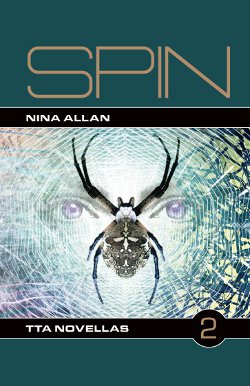 AMS: It’s interesting that Christy’s story is the core around which the novel developed, and that at one point it was just her and the scene with the mirror, because I found that sequence particularly evocative, haunting and memorable. Earlier you mentioned the Katherine Mansfield, John Cheever, Raymond Carver, John McGregor and Helen Simpson, while on her shelves Christy, who is also a writer, has books by ‘Alice Munro, Ingeborg Bachmann, Flannery O’Connor, John Cheever and Raymond Carver’, so it’s clear you identify with her strongly. That moment with Christy and the mirror is one of just two moments in her section of the book when The Race becomes at all fantastical. Otherwise Christy’s part of the novel is rooted very much in the ‘real world’ as most people perceive it most of the time. But the scene with the mirror has many resonances, from Alice onwards, not least the opening chapter of Christopher Priest’s The Extremes. Given your relationship with Chris Priest, how deliberate was this? Along with the ‘literary’ writers you name-check in The Race, you also specifically cite the, what we might call ‘literary fantasy’, Memoirs of a Survivor by Doris Lessing (a work which similarly features a young girl, a different reality and a world in decline) as well as genre writers Philip K. Dick, Samuel R. Delany. Which raises the question, is The Race a science fiction or fantasy novel, and does it matter what label readers and critics might attach to it, or do we spend too long worrying about categories and genre boundaries and definitions and not enough time thinking about what writers are actually writing about?
AMS: It’s interesting that Christy’s story is the core around which the novel developed, and that at one point it was just her and the scene with the mirror, because I found that sequence particularly evocative, haunting and memorable. Earlier you mentioned the Katherine Mansfield, John Cheever, Raymond Carver, John McGregor and Helen Simpson, while on her shelves Christy, who is also a writer, has books by ‘Alice Munro, Ingeborg Bachmann, Flannery O’Connor, John Cheever and Raymond Carver’, so it’s clear you identify with her strongly. That moment with Christy and the mirror is one of just two moments in her section of the book when The Race becomes at all fantastical. Otherwise Christy’s part of the novel is rooted very much in the ‘real world’ as most people perceive it most of the time. But the scene with the mirror has many resonances, from Alice onwards, not least the opening chapter of Christopher Priest’s The Extremes. Given your relationship with Chris Priest, how deliberate was this? Along with the ‘literary’ writers you name-check in The Race, you also specifically cite the, what we might call ‘literary fantasy’, Memoirs of a Survivor by Doris Lessing (a work which similarly features a young girl, a different reality and a world in decline) as well as genre writers Philip K. Dick, Samuel R. Delany. Which raises the question, is The Race a science fiction or fantasy novel, and does it matter what label readers and critics might attach to it, or do we spend too long worrying about categories and genre boundaries and definitions and not enough time thinking about what writers are actually writing about?
Nina Allan: It’s interesting that you should mention that scene in The Extremes. I’ve always loved that prologue, consider it a tour de force, and like the prologue to The Glamour before it it’s a perfect miniature story in its own right. In answer to your question, no, the scene with Christy and the mirror was not in any way a deliberate ‘quoting’ of the scene with the young Teresa in The Extremes. Indeed I did not consciously discern any parallels between the two until after the novel was finished.
The question of influence is always a vexed one, for any writer. I was a reader and admirer of Chris’s fiction long before we met in person – twenty years before, in fact, and our coming together as people was a direct result of our attraction to and concern with an allied range of themes, preoccupations and stylistic concerns in literature generally and science fiction in particular. Of course we’re very different as writers, both in the way we construct our fiction and where we place our emphases. Chris always starts with an idea – he says he can’t begin to work on something until he knows what it is ‘about’. Whereas I tend to begin with a character or a set of characters in a landscape and – as described before – just niggle away at the material until I find their story. We find different things important, even though we’re drawn to similar topics.
Literature exists and develops in a series of increments, or evolutions, with one generation of writers inevitably exerting its influence upon the next. I think this is especially true and fascinating in the field of science fiction literature, where ‘the conversation’, both literal and metaphorical, between individual writers and generations of writers has always formed an important component of its specific nature. I believe that Chris’s books are original and very powerful individually, but more than that, as a science fiction writer Chris was doing new things right from the start, opening up new ways of seeing reality and new ways of writing science fiction, bringing science fiction and literature together in forms that had rarely if ever been attempted before. His influence on newer writers (and film makers, too – Charlie Kaufman’s Eternal Sunshine of the Spotless Mind, Christopher Nolan’s Inception and Duncan Jones’s Source Code, for example, are all influenced massively by The Extremes, The Affirmation and The Glamour, whether these directors are consciously aware of that or not) is clear and important. I find it hard to imagine what science fiction might look like today without Chris’s influence – and that the next generation of writers should draw from and build on that is both natural and good. As a writer, I’m proud to own that influence. Equally, I’d say that my personal relationship with Chris is purely incidental.
As to whether genre boundaries matter, if you’d asked me this question a couple of years ago you might have got a different answer!
I always tended towards the view – increasingly popular among genre writers – that categories are unimportant, that it’s the work that matters. In some respects this remains as true for me as it always has. The idea that characterisation or realistic psychology, for example, will always be subservient to plot in a genre novel, that a broad-brush, simplistic approach to such elements is part of what defines genre fiction, is plainly ridiculous – those who doubt it should go and ask James Ellroy or Caitlin R. Kiernan and see what answers they get.
However, with the increasing adoption of speculative materials into mainstream idioms, with varying degrees of success, I’ve found myself drawn increasingly towards a more idealistic, proactive view of science fiction that says yes, genre boundaries are important, but in a positive sense. In mainstream literary fiction, what the writer does could be defined as reproducing what is already out there – quantifying it for the reader, analysing it, perhaps re-examining it through a more experimental literary form. But at some level it remains the literary equivalent of photorealism – its success is at least partly defined by how ‘real’ the fiction feels, how much it confirms the reader’s own experience of reality. In the case of speculative fiction, the effect is the opposite – to confound, rather than to reproduce, the reader’s experience of reality, and through confounding it make the reader consider their personal preconceptions and prejudices. What is reality and who defines it? Can there be more than one version of reality? Is reality a subjective thing anyway?
An increasing number of mainstream writers have turned to science fiction as a possible mode of expression, as a way of making their fictions appear more current, more relevant. Time travel, alternate reality, artificial intelligence, cloning – these things are everywhere in the news now, in films and on TV, and as a result writers who might have deemed these subjects preposterous and unworthy of notice a decade ago have begun to decorate their work with these fancy gewgaws. SF has become ‘acceptable’ as a literary contrivance. I happen to believe, though, that science fiction is an attitude of mind, a lifetime’s project, not something you can dip in and out of and hope to be successful at. The most obvious accusation that SF readers and writers throw at mainstream ‘tourists’ is that they’re reinventing the wheel, that the cool dystopia or cloneworld or whatever they think they’ve invented has already been done before, many times, and better. This is true enough – some of those writers keen to try their hand at SF clearly aren’t as keen to familiarise themselves with its modern classics. It’s more than that, though, something more subtle, something about understanding that science fiction is about more than cool ideas and a world ruled by robots. I’d say it is about commitment.
Speaking for myself, I think that SFF has always been the most exciting form of literature around. Its potential is limitless, its forms so various that a shortage of ideas should never be in question. There is something charged about SF, something directed. The art and craft of fiction – characterisation, sense of place, the styling of language – are and always have been of paramount importance to me, but so too is speculation, the confounding of expectations, the exploration of other universes. Realistic mainstream literature feels increasingly, to me, as if it has something missing from it, as if it halts on the threshold of discovery. I cannot imagine writing anything that did not aim to go beyond that threshold.
In short, yes, The Race is science fiction.
Click here for Part 2 of this interview
…is a freelance editor, writing consultant and story structure expert. To find out more, including hiring me to work on your writing project, read my profile or visit my website, To The Last Word.

